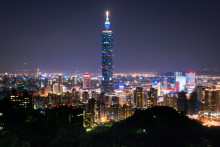'I wanted to know how a country works if it´s not recognized by the UN,' begins Maite Vermeulen, who writes for De Correspondent. 'When I met with one of the official Taiwanese representatives, I wondered if not being able to join any international organization really represented a problem. He looked at me and said three words: 'Yes, remember SARS.' Because when this virus appeared in Taiwan, the local government couldn´t get any information or aid from the World Health Organization, because they don´t recognize Taiwan as a country.' How is this possible?
For all practical purposes, Taiwan has functioned as an independent country since 1950´s. However, even calling the region 'Taiwan' or 'independent' or 'a country' is officially incorrect. The island with 23 million inhabitants, located off the southeastern coast of mainland China, calls itself 'The Republic of China', while mainland China considers Taiwan its province and calls the region 'Chinese Taipei'. Yes, it is rather complicated.
One China, two governments
To understand the current situation of Taiwan, we need to look into its history. 'In the 17th century, Taiwan was actually a Dutch colony. Afterwards came the Chinese, Mongolians, Spaniards, French and then Japanese,' explains Vermeulen. 'Japan ruled in Taiwan until the end of World War II. Due to losing the war, Japan signed a peace declaration, under which it would transfer Taiwan to China.'
In 1940´s China was experiencing a long civil war between the Nationalist Party, led by Chiang Kai-Shek, and the Chinese Communist Party with Mao Zedong as their leader. When the Communists won in 1949, the Nationalist government and its 2 million supporters fled to Taiwan, where they established the 'wartime capital' of the Republic of China. Since then, both the Nationalists in Taiwan and the Communistic government in mainland China have been claiming to be the 'one, real China'.
An unresolved issue
For some time, the Republic of China (meaning the 'Taiwanese China') had the Chinese seat in the UN. However, in 1971 this seat was given to People´s Republic of China (the mainland China). Since then, Taiwan has not been represented in the UN and it is recognized as a country only by its 22 diplomatic allies, that mostly consist of very small island states. Although China still claims that Taiwan is its province, they have no real power there and Taiwan functions independently.
The issue of Chinese sovereignty over Taiwan is still very present in today´s Chinese society. 'Recently there has been a good example of how sensitive this topic is,' says Vermeulen. 'An Asian pop star Chou TzuYu, a 16 year old girl born in Taiwan, waved a Taiwanese flag on TV, which caused an outrage and she was forced to stop performing and record a formal apology. ' (You can see the video below.)
Economy first, politics later
'Taiwan has spent a lot of resources on lobbying and trying to get into the UN, but so far without any success,' continues Vermeulen. 'The more they lobby, the angrier China gets, so now Taiwan adopted a new strategy and instead of asking for full membership, they ask international organizations to grant them 'meaningful participation', thanks to which they are now involved in 36 organizations, including the Olympics.'
To ensure economic growth, Taiwan follows 'economy first, politics later' policy, which might be among the reasons why they are one of the 30 largest economies in the world. And guess who is Taiwan´s biggest trade partner? Yes, it is China. 'Even countries that don´t recognize Taiwan trade with them. In 2010 Taiwan and China signed a free trade agreement and since then the cooperation has massively increased. There are 865 direct flights between China and Taiwan every week. The trade between Taiwan and China is made possible thanks to independent foundations in each country, which are officially not related to local governments.But economic progress also means that Taiwan needs to keep the political status quo and can´t push for independence, ' explains Vermeulen.
Will Taiwan fight for its independence?
Nevertheless, this month´s Taiwanese elections were won by Democratic Progressive Party, which has been calling for an independent Taiwan, so we will see what will happen. Taiwan needs to tread carefully, though, because China seems to feel very strongly about their claim over the region and other countries in the world have applied 'one China policy', supporting mostly the People´s Republic of China. The sensitivity of the issue was also confirmed by some passionate comments from Chinese members of the audience at the Studium Generale lecture, during which several Chinese people pointed out that China certainly won´t give Taiwan up without a fight.







